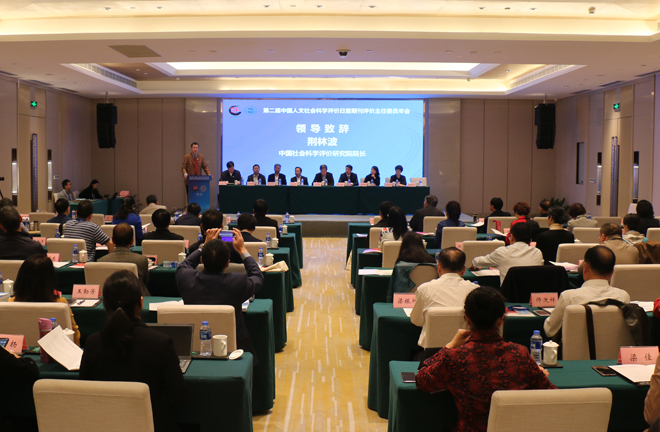Forum explores key to better academic evaluation system

The academic evaluation conference held in Suzhou Photo: Wu Nan/CSST
SUZHOU—A booming humanities and social sciences community calls for the guidance of a sound academic evaluation system and a strong supporting network of high-quality academic periodicals.
With that in mind, nearly 70 representatives from academia and periodical publishing circles attended a conference held on Oct. 26 to come up with a better evaluation system for both academic papers and periodicals.
Jing Linbo, director of the Chinese Academy of Social Sciences Evaluation Studies, offered his advice on how to build a reliable and transparent evaluation system for the achievements made in philosophy and the social sciences: “It’s better to combine a few methods together when doing periodical evaluation, including subjective assessment, objective evaluation, qualitative evaluation and quantitative assessment.”
“The problems that most countries face in this regard are basically the same; so are their solutions. China, on the other hand, has taken the lead by bringing in an expert panel for peer review. The move was widely well-received by academia in Europe, and it deserves to be put into use globally,” said Jing.
Cheng Wei, deputy director of the Institute of Foreign Literature at the Chinese Academy of Social Sciences (CASS), said that any academic evaluation system that relies too much on data is too rigid to reflect the needs of different subjects, thus peer review could help.
The purpose of evaluation is to improve academic quality, and that is why the rules have to be reasonable and must conform to the logic behind academic development, said Cheng Boqing, dean of the School of Social and Behavioral Sciences at Nanjing University.
Ma Feicheng, a professor from the School of Information Management at Wuhan University, said that social sciences research is greatly influenced by factors including national conditions and ideologies.
Regarding the evaluation of humanities and social sciences research, Ma suggested that we should focus on not only the differences but also the similarities between China and other countries. Finding out common features could help raise China’s academia in the international arena.
Chief Editor of Public Finance Research Liu Shangxi shared his observations on the responsibilities of academic journals: “Periodicals evaluation is like a baton that leads the humanities and social sciences. Academic journals evaluation should not only use their current technologies and methods, but also draw on the advanced experience from other countries.”
According to Liu, periodicals evaluation should go beyond technical assessment and start to focus more on its value as well as its potential influence on humanities and the social sciences.
Liu added that periodicals are not just platforms that help to spread knowledge but incubators for future works. Therefore, editors should learn to reach out to promising writers and take on the role of “midwives” for new knowledge.
Tan Xiuying, chief editor of the Journal of International Security Studies, suggested that periodicals should stress the importance of research integrity and advocate the establishing of rules and regulations for academic integrity.
To be specific, Tan came up with proposals: Set up an academic community, ensure that the authors are fully informed and engaged in the process of publishing their work, formulate a stringent system for papers reviewing and credibility checking, and enhance the teaching of integrity in colleges and universities.
edited by WEN RONG
